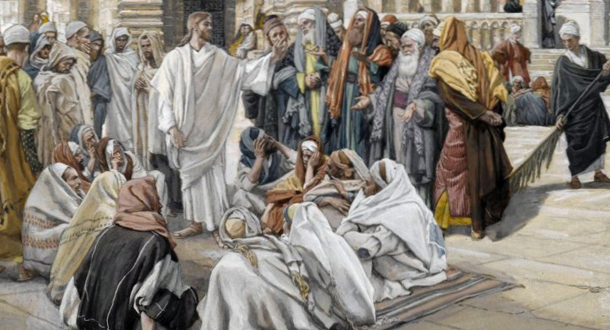
Scripture:
Daniel 3:14-20, 91-92, 95
John 8:31-42
Reflection:
There is an annual event in the U.S. called March Madness, and it refers to competitive college basketball teams from across the nation, representing those with the best win-loss records, playing one another, in an effort to establish the team recognized as the best team, because it has emerged as the winner of the final game between the two teams that are recognized as the best two teams in the nation. It legitimately claims to be the best basketball team in the nation.
Today we listen to our bible readings that more or less follow the same course of action, in a completely different venue: it is a religious contest, either between Israel and a foreign nation such as Babylon, or else factions within Israel itself.
The struggle between Babylonia and Israel centered on the religions of these two nations. For the military struggle had already taken place, and Babylonia (Chaldea) won that part of the struggle. But then the king, Nebuchadnezzar, moved the struggle beyond the military part of it, and centered it on the religious element, for he, pagan that he was, had a huge golden statue set up representing the god the king worshipped, and he issued an order that everyone in his kingdom worship it. This included the Jews, held captive in his country, and of course the Jews had an abhorrence for idolatry, listed among the ten commandments as the first of the sins to avoid. When three young Jewish men among the captives refused to worship this false god, it was reported to the king, who, in a rage, had them thrown into a fiery furnace, but they miraculously survived this ordeal, thanks to the protection offered them by God, and this won the admiration of the king for their God. So, while the Chaldeans won the military phase of their struggle with the Jews, the Jews won the religious phase of it.
And a similar struggle is described in today’s gospel, between Jesus, and the opponents among His fellow Jews, concerning the quality of their allegiance to their father Abraham. Jesus challenges the legitimacy of their claim to be Abraham’s children, over against His own claim about God as His Father.
We have in these two instances a contest underway to establish the validity of these claims and counterclaims about who is one’s father. And it ultimately comes down to the quality of the claims about fatherhood, with the Jews claiming both Abraham as their father, (as well as God), and Jesus speaking solely of God as His Father. Any intimate relationship, such as to one’s father, centers on the love to be found at its heart and core. The three young men demonstrated this in the fiery furnace, showing their love for God by trusting in His protection, and Jesus relied on His loving relationship to God as His Father in establishing His credentials, which enabled Him to challenge the claims of His opponents who focus on having Abraham as their father, because He sees no love in the opposition He is encountering from them. Today’s readings, while giving God (or god) a central place in this relationship, suggest that we check the kind of love at play this Lent, amid the competing claims made about what genuine love truly is.
Fr. Sebastian MacDonald, C.P. is a member of the Passionist Community in Louisville, Kentucky.
